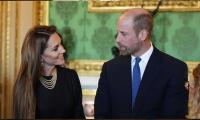Staff-level agreement with IMF: Country’s economy still vulnerable to external shocks
Long-term trajectory indicates another global crisis might hurt Pakistan’s economy
ISLAMABAD: Though Pakistan’s incumbent coalition government has averted an imminent default after it reached a staff-level agreement with the IMF, the economy is still vulnerable to external shocks with growing debts. And there is no immediate danger of collapse as oil and commodity markets are soft at the moment.
This is an orange light but not red. Nonetheless, the long-term trajectory indicates another global crisis might hurt Pakistan’s economy more than one can believe; Pakistan is among five countries most vulnerable to default according to Bloomberg. If the economy is not reformed, the country will head for more trouble in the medium term although default has been averted for now.
This is the bitter fact that the country has remained most of the time in severe balance of payment crises since its birth on account of not up-to-the-mark exports owing to which the country’s economy remains vulnerable. India and Bangladesh have left Pakistan behind despite pervasive corruption and their chaotic democracies. The main reasons behind their progress are political stability and a comparatively higher level of human development, especially the female literacy rate and more participation of women in the workforce.
The News tried to find out why there is always an impression that Pakistan’s economy is near collapse; why Pakistan is dependent on the IMF bailouts every time when a new government takes charge; why the country relies on loans from friendly countries like KSA, China, and the UAE for its reserves and why its reliance increases on imports of energy, wheat and edible oil and what is the way forward to make the country stand on its feet. The News managed the viewpoints of eminent independent economists of the country, which are part of the story.
Economist Kaisar Bengali said about the impression that has developed about collapse whenever the government changes, that he has been saying for the last three years that Pakistan has gone into technical bankruptcy as it borrows loans to pay the previous ones and it is unable to pay debt and interests from its own resources.
Bengali says when a state is not able to pay the loans to its creditors from its own resources, it goes bankrupt and when there is no refinancing available to pay debt, then the state becomes a defaulter. He said the IMF has again saved the country from collapse.
Bengali said Pakistan is currently getting a loan to either pay previous loans and interests or finance imports. It is not getting a loan for any project. He suggested to the government to massively cut non-development expenditures, including non-combat defence expenditure, by Rs 1 trillion, slash down imports by 20 percent and increase revenues and exports up to the optimum level. He also went on to say that reserves of the country have further plummeted to $9.7 billion, which comprises loans, and net reserves are in negative. He also disclosed that if Pakistan exports items worth $100 and against it the country imports items worth $220.
Mentioning the reasons behind the country’s vulnerable economy, Yousaf Nazar, a former head of Citigroup’s Emerging Markets Investments quoted Pakistan Human Development Report published by the United Nations in 2021 that the economic privileges accorded to Pakistan’s elite groups, including the corporate sector, feudal landlords and the country’s powerful military, add up to an estimated $17.4 bn, or roughly 6 per cent of the country’s economy.
The biggest beneficiary of the privileges – in the form of tax breaks, cheap input prices, higher output prices or preferential access to capital, land and services – was found to be the country’s corporate sector, which accrued an estimated $4.7 bn in privileges, the report said.
Nazar said that Pakistan’s ruling elites have relied on a protectionist economy, foreign bailouts and remittances for decades. He hoped that Pakistan’s establishment has learnt the most important lesson that the current economic crisis can teach it: Pakistan is no longer that important in the grand chessboard of international politics that it used to be. Saudi Arabia and China didn’t rush to our help. He added: “The West pretty much ignored us, notwithstanding our delusions of being a nuclear power and therefore of vital importance to global security.” In short, a rent-seeking economy driven by tax exemptions and concessions is not competitive internationally and is the primary reason for the country’s recurring balance of payments crises. Since Pakistan’s exports have not grown compared to its competitors, it is especially vulnerable to oil price shocks given its huge dependence on imported fuel.
“India surpassed $400 billion in exports in FY2022, an all-time high, comfortably higher than the five-year average of $300 billion before coronavirus struck. India’s FX reserves at nearly $600 billion, are the world’s fourth-largest.
“Bangladesh’s export earnings in July-April of the current financial year 2021-22 stood at $43.34 billion (Pakistan $26.2 billion) with a 35.14-per cent growth (Pakistan 25.5 per cent) compared with that of $32.07 billion in the same period of FY2020-21.
“Both India and Bangladesh have left Pakistan decades behind despite the pervasive corruption and their chaotic democracies. The main reasons are political stability and a comparatively higher level of human development, especially the female literacy rate and more participation of women in the workforce.”
Nazar said: “We need a radical reset of our domestic and foreign policies.” He asked for steps to liberalise trade with India to make the market for essential commodities more competitive and reduce inflation. He also asked the government to ensure peace to grow and attract foreign investments, mentioning that Pakistan simply doesn’t have the diplomatic or economic clout to force negotiations on Kashmir. He stressed the need to open trade more than India does, and this is how the country can attract more FDI if it pursues an open trade policy.
Giving the way forward, he asked for imposition of a financial emergency under Article 235(1) of the Constitution and urged the provinces to collect at least Rs100 bn through higher taxes on land, property, and agricultural income. It is a shame that all of Punjab with its 100 million-plus population, collects less urban property taxes than the city of Chennai in India, which is home to about 10 million people. During FY2020-21, the provincial government of Punjab collected a paltry Rs2.5 billion ($15.6 million) from agricultural income tax. “This is completely unacceptable. Large landlords must be made to share an equitable burden.”
He also asked for imposition of a special emergency tax of Rs500,000 on vehicles of 1600cc or more. This can bring in at least Rs20 bn. Double the electricity tariff on residential properties of 800 sq yards or more.
Nazar recommended a cut in non-combat defence spending by Rs100 bn out of the total defence budget of more than Rs1.3 trillion. “Downsize the federal govt and abolish/downsize all those divisions that handle subjects that have been transferred to the provincial governments. This can bring in an additional Rs30 bn,” he argued. He asked for a ban on all land allotments and urged to make it mandatory to sell the state land by public auction only and launch a privatisation program to create an investment-friendly environment.
Dr Khaqan Najeeb, former Adviser Ministry of Finance, said that a slower- than-needed effort on structural reforms in the economy has pushed Pakistan into several balance of payment crises since its birth. This has been the key reason for Pakistan has needed the IMF support all the time.
“The current Balance of Payment difficulties are more challenging as the constellation is far more concerning. The political atmosphere is much more charged and the global environment is less helpful with higher commodity prices slowing economic growth and rising inflation. If all this was not already overwhelming, the issues in the economy and energy sector are far more complex.”
He went on to say said the staff-level agreement with the IMF is a good beginning and gives breathing space and certainly averts fears of any imminent default. But beyond the program targets, serious work is to upgrade the productive capacity of Pakistan’s industry and agriculture sector. Food security is an area of concern and is now a burden on imports as well. A good place to start would be to let markets set prices of agriculture commodities with the government maintaining strategic stocks where ever necessary. Real hard work is required for import substitution in food items, by concentrating on improving yields of staple crops, creating well-functioning agriculture markets.
Dr Khaqan explained the energy sector needs astute management in the short run coupled with a serious structural reform effort to move it out of the public sector and create a market for energy in Pakistan. It must be realised there are 28 SOEs operating in the power & oil sector, and the divestment process must at least begin. In addition, replacement of imported coal with Thar coal by upgrading existing power plants and gasification of coal to substitute coal for gas must be done on priority.
He also pinpointed that manufacturing as a percentage of GDP is down to 13.8% and export fundamentals are in dire need of correction. Businesses are not incentivised enough to enter the export market. Low productivity and little diversification continue to be perennial unsolved issues. Weaknesses in exports need a structural correction. He concluded that Pakistan’s export competitiveness needs a tariff rationalization strategy and ensuring financing for expansion in production. The real hard work is to upgrade the productivity of businesses as well as their innovative capacity. These are the changes needed to integrate with the world and achieve long-term external account stability.
Dr Ashfaque H Khan, Principal and Dean at NUST School of Social Sciences and Humanities, said the country has moved into a state of disequilibrium from April 10, 2022. He said since he doesn’t buy the contents of the recently published article of Michael Rubin with the headline ‘Pakistan’s collapsing economy should worry the world’ but if the status quo remains and no efforts are taken for corrective measures, then the country would head towards collapse. He said that the country has the only option of holding fair, free, and transparent elections to bring the country towards a state of equilibrium.
Miftah Ismail, Finance Minister of Pakistan, says that the country has come out of imminent collapse after his government has taken hard but corrective decisions and reached with the IMF a staff-level agreement. The PTI government in its tenure left the country on the verge of collapse with unsustainable debt and liabilities of Rs53.544 trillion by borrowing Rs20,000 billion. The PTI government also put the country in the lurch with a trade deficit of $48 billion and a current account deficit of $17 billion.
In February 2022, ex-Prime Minister Imran Khan reduced the POL and electricity prices with a loss to the national kitty of Rs120 billion every month putting the country on the path to default. He said the government has done away with the subsidies on POL products and also passed relief in the wake of lower prices of petroleum products in the global market on to the masses.
To reduce the reliance on energy imports, he said, the government will generate 5,000-6,000MW solar electricity which will help reduce the electricity generation from load-based power plants that use imported fuel at the cost of foreign exchange reserves for electricity generation. He said gradually the government will solarise all government buildings and tubewells across the country, which also help reduce the economy’s vulnerability to external shocks. The government will also focus on power generation based on Thar coal so that reserves do not deplete. Similarly, the government is going to give huge incentives to increase agriculture production, so that the country does not import wheat.
Miftah says that the country will get $1.2 billion in deferred oil payment facility from a friendly country. “We think that a foreign country will invest between $1.5 to $2 billion in stocks on a G2G (government-to-government) basis, and another friendly country will perhaps give us gas on deferred payment and another friendly country will make some deposits.”
Depleting reserves, a widening current account deficit and the depreciation of Pakistani rupee against the US dollar have left the country facing a balance of payment crisis. He said the country will also get around $6 billion from the World Bank and Asian Development Bank in FY2022-2023.
-
 2026 Golden Globes: Nikki Glaser Mocks Leonardo DiCaprio's Notorious Dating Habits
2026 Golden Globes: Nikki Glaser Mocks Leonardo DiCaprio's Notorious Dating Habits -
 Prince Harry 'loved' Seeing Charles, Eyes More Meetings With King: Source
Prince Harry 'loved' Seeing Charles, Eyes More Meetings With King: Source -
 Chad Michael Murray Admits 2000s Fame Could Have 'destroyed' Him
Chad Michael Murray Admits 2000s Fame Could Have 'destroyed' Him -
 Emma Stone Reflects On Diane Keaton's 'most Valuable' Lesson
Emma Stone Reflects On Diane Keaton's 'most Valuable' Lesson -
 Kanye West Once Paid $1 Million Per Day To Record Album: Here's Why
Kanye West Once Paid $1 Million Per Day To Record Album: Here's Why -
 Prince Harry Hopes To Show Archie, Lilibet Where He 'grew Up'
Prince Harry Hopes To Show Archie, Lilibet Where He 'grew Up' -
 Jacob Elordi Names Childhood Crushes Including A Major 60s Star
Jacob Elordi Names Childhood Crushes Including A Major 60s Star -
 Kristin Davis Dicusses Fate Of Her Sex And The City Character
Kristin Davis Dicusses Fate Of Her Sex And The City Character -
 Noah Wyle Gushes Over 30-year Bond With George Clooney: 'Real Touchstone'
Noah Wyle Gushes Over 30-year Bond With George Clooney: 'Real Touchstone' -
 Zara Larsson Steps Up Criticism Against 'evil' Policies
Zara Larsson Steps Up Criticism Against 'evil' Policies -
 Adam Sandler Jokes About Aging As He Accepts Career Honour
Adam Sandler Jokes About Aging As He Accepts Career Honour -
 Royal Stalker Cases Increase Following Harry, Meghan's Marriage: Report
Royal Stalker Cases Increase Following Harry, Meghan's Marriage: Report -
 Sarah Ferguson Eyes Princess Diana’s Private Letters In Bid To Secure Future
Sarah Ferguson Eyes Princess Diana’s Private Letters In Bid To Secure Future -
 Andrew Plots Secret Sales Of Royal Jewels Amid Royal Lodge Eviction
Andrew Plots Secret Sales Of Royal Jewels Amid Royal Lodge Eviction -
 Abbott Elementary Star Chris Perfetti Hints At What To Expect From Season 5
Abbott Elementary Star Chris Perfetti Hints At What To Expect From Season 5 -
 Prince William Always Ready To Step Up: ‘He’s Barely Able To Contain His Fury When Kate’s Involved’
Prince William Always Ready To Step Up: ‘He’s Barely Able To Contain His Fury When Kate’s Involved’




